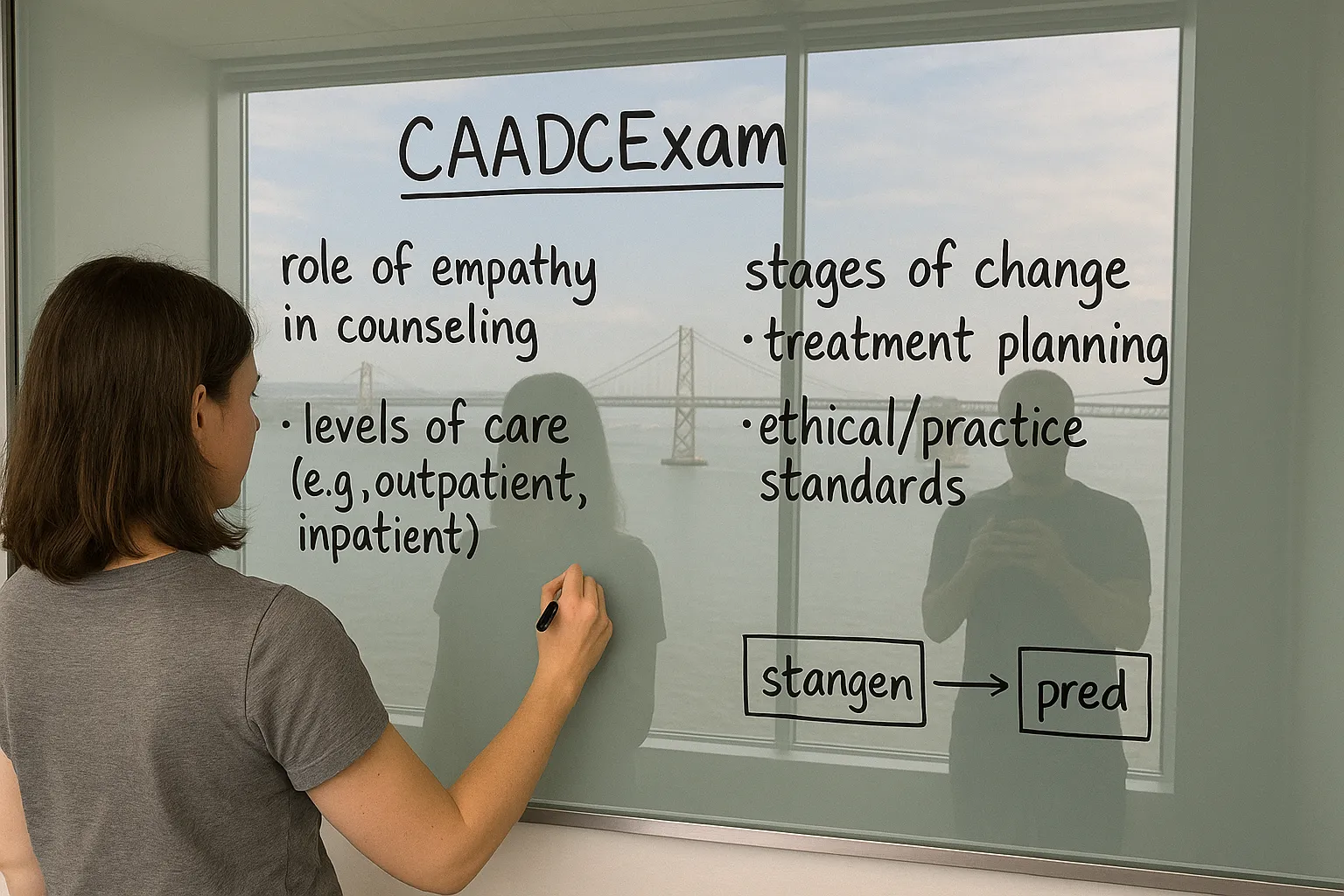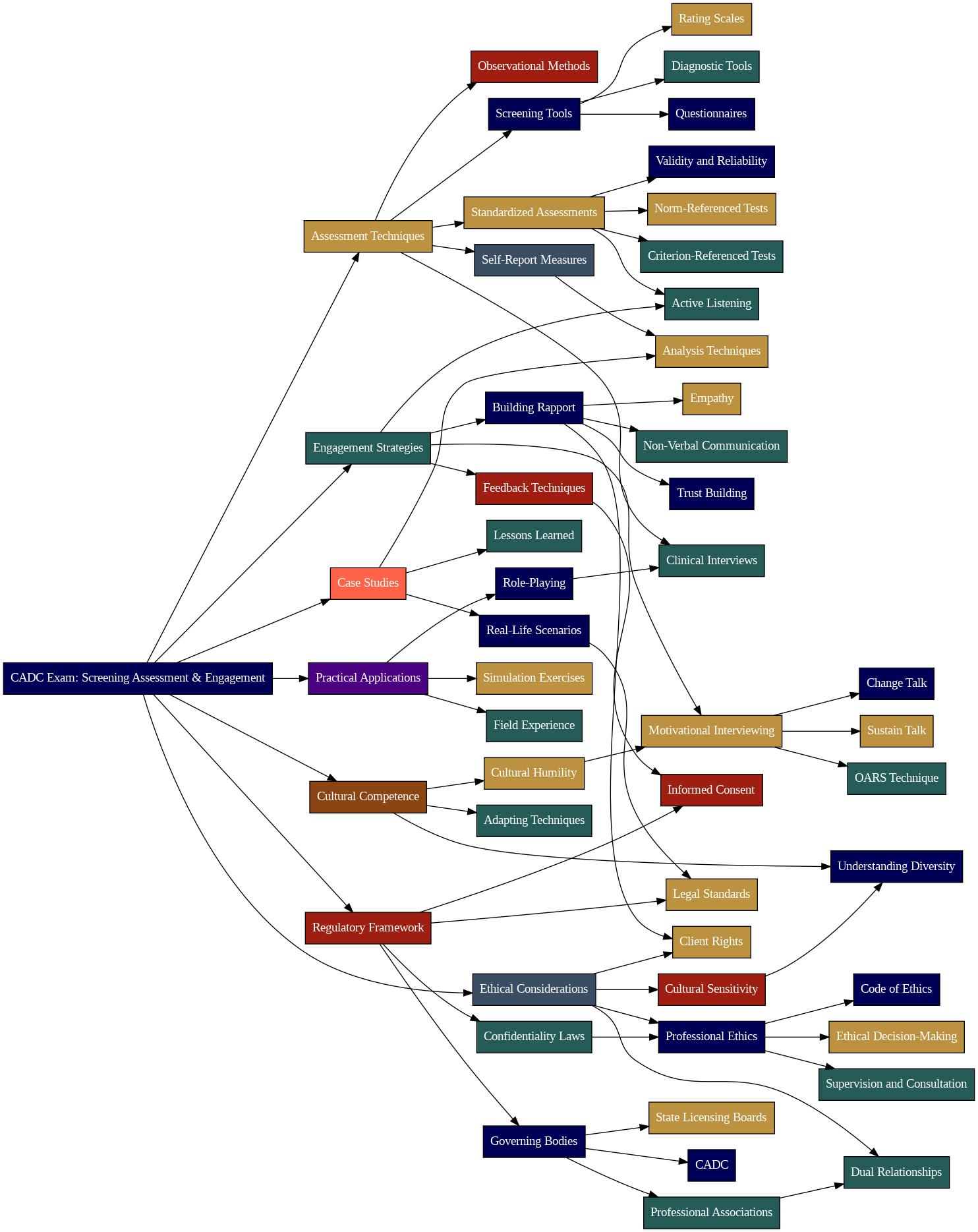Quiz-summary
0 of 30 questions completed
Questions:
- 1
- 2
- 3
- 4
- 5
- 6
- 7
- 8
- 9
- 10
- 11
- 12
- 13
- 14
- 15
- 16
- 17
- 18
- 19
- 20
- 21
- 22
- 23
- 24
- 25
- 26
- 27
- 28
- 29
- 30
Information
Premium Practice Questions
You have already completed the quiz before. Hence you can not start it again.
Quiz is loading...
You must sign in or sign up to start the quiz.
You have to finish following quiz, to start this quiz:
Results
0 of 30 questions answered correctly
Your time:
Time has elapsed
Categories
- Not categorized 0%
- 1
- 2
- 3
- 4
- 5
- 6
- 7
- 8
- 9
- 10
- 11
- 12
- 13
- 14
- 15
- 16
- 17
- 18
- 19
- 20
- 21
- 22
- 23
- 24
- 25
- 26
- 27
- 28
- 29
- 30
- Answered
- Review
-
Question 1 of 30
1. Question
Which of the following is a CORE principle of Motivational Interviewing (MI) that an Arizona LISAC should utilize when working with clients who are ambivalent about changing their substance use behavior?
Correct
Motivational Interviewing (MI) is an evidence-based counseling approach that focuses on enhancing a client’s intrinsic motivation to change. A core principle of MI is expressing empathy, which involves understanding and reflecting the client’s perspective without judgment. This helps build rapport and trust, creating a safe environment for the client to explore their ambivalence about change. Confrontation, while sometimes used in traditional substance abuse counseling, is generally avoided in MI as it can increase resistance. Directing the client or providing unsolicited advice can undermine their autonomy. Instead, MI emphasizes collaboration, evocation (drawing out the client’s own motivations), and autonomy support. Therefore, expressing empathy is a fundamental aspect of MI that aligns with its client-centered approach. This approach is widely used by Arizona LISACs.
Incorrect
Motivational Interviewing (MI) is an evidence-based counseling approach that focuses on enhancing a client’s intrinsic motivation to change. A core principle of MI is expressing empathy, which involves understanding and reflecting the client’s perspective without judgment. This helps build rapport and trust, creating a safe environment for the client to explore their ambivalence about change. Confrontation, while sometimes used in traditional substance abuse counseling, is generally avoided in MI as it can increase resistance. Directing the client or providing unsolicited advice can undermine their autonomy. Instead, MI emphasizes collaboration, evocation (drawing out the client’s own motivations), and autonomy support. Therefore, expressing empathy is a fundamental aspect of MI that aligns with its client-centered approach. This approach is widely used by Arizona LISACs.
-
Question 2 of 30
2. Question
During a counseling session in Arizona, LISAC, Javier, learns that a client’s child has unexplained bruises and seems fearful of their stepfather. The client dismisses these concerns as clumsiness. Under Arizona law regarding mandatory reporting, what is Javier’s most appropriate course of action?
Correct
In Arizona, LISACs are mandated reporters under A.R.S. § 13-3620, which pertains to the reporting of child abuse and neglect. This statute compels professionals, including licensed counselors, to report suspected instances of child abuse or neglect to the appropriate authorities, such as the Department of Child Safety (DCS). The critical element in determining whether to report is reasonable suspicion, not absolute certainty. Reasonable suspicion implies that, based on the available information, a prudent person would have grounds to believe that abuse or neglect has occurred or is occurring. This standard protects children while also acknowledging the limitations of a counselor’s investigative capabilities. The counselor is not required to conduct a full investigation but must act on credible concerns. Failure to report suspected child abuse or neglect can result in legal penalties for the LISAC. It is crucial for LISACs to document the basis for their suspicion and the steps taken to report the concern. This documentation serves as evidence of compliance with the mandatory reporting law and protects the counselor from potential liability. Additionally, LISACs should seek consultation with supervisors or legal counsel when uncertain about whether the threshold for reporting has been met, ensuring ethical and legally sound decision-making. The priority is always the safety and well-being of the child.
Incorrect
In Arizona, LISACs are mandated reporters under A.R.S. § 13-3620, which pertains to the reporting of child abuse and neglect. This statute compels professionals, including licensed counselors, to report suspected instances of child abuse or neglect to the appropriate authorities, such as the Department of Child Safety (DCS). The critical element in determining whether to report is reasonable suspicion, not absolute certainty. Reasonable suspicion implies that, based on the available information, a prudent person would have grounds to believe that abuse or neglect has occurred or is occurring. This standard protects children while also acknowledging the limitations of a counselor’s investigative capabilities. The counselor is not required to conduct a full investigation but must act on credible concerns. Failure to report suspected child abuse or neglect can result in legal penalties for the LISAC. It is crucial for LISACs to document the basis for their suspicion and the steps taken to report the concern. This documentation serves as evidence of compliance with the mandatory reporting law and protects the counselor from potential liability. Additionally, LISACs should seek consultation with supervisors or legal counsel when uncertain about whether the threshold for reporting has been met, ensuring ethical and legally sound decision-making. The priority is always the safety and well-being of the child.
-
Question 3 of 30
3. Question
A Licensed Independent Substance Abuse Counselor (LISAC) in Arizona, Javier, is retiring and closing his private practice. According to Arizona law and ethical guidelines, what is Javier’s *most* critical responsibility regarding his client records?
Correct
Arizona Revised Statutes (A.R.S.) § 32-3305 outlines the requirements for client records maintenance for behavioral health professionals, including LISACs. These records must be kept confidential and retained for at least six years following the client’s last date of service. Exceptions exist, such as when a minor client reaches the age of majority plus three years, or when legal or ethical considerations mandate a longer retention period. Destroying records requires a secure method that protects client confidentiality, such as shredding or incineration. Abandoning client records is unethical and potentially illegal. LISACs must have a plan in place for the secure storage and disposal of records in case of their incapacitation or death. The plan should designate a qualified professional to manage the records and notify clients of their options for accessing or transferring their records. This ensures continuity of care and protects client confidentiality.
Incorrect
Arizona Revised Statutes (A.R.S.) § 32-3305 outlines the requirements for client records maintenance for behavioral health professionals, including LISACs. These records must be kept confidential and retained for at least six years following the client’s last date of service. Exceptions exist, such as when a minor client reaches the age of majority plus three years, or when legal or ethical considerations mandate a longer retention period. Destroying records requires a secure method that protects client confidentiality, such as shredding or incineration. Abandoning client records is unethical and potentially illegal. LISACs must have a plan in place for the secure storage and disposal of records in case of their incapacitation or death. The plan should designate a qualified professional to manage the records and notify clients of their options for accessing or transferring their records. This ensures continuity of care and protects client confidentiality.
-
Question 4 of 30
4. Question
During a counseling session in Phoenix, Arizona, a client, Javier, expresses anger towards his estranged business partner, stating, “I’m so furious, I could seriously hurt him.” Javier has a history of impulsive behavior and owns several firearms. As an Arizona LISAC, what is your most appropriate initial course of action regarding your duty to warn and protect?
Correct
Arizona Revised Statutes (A.R.S.) § 32-3306 outlines the requirements for confidentiality and privileged communication for licensed behavioral health professionals, including LISACs. This statute aims to protect the privacy of clients seeking substance abuse treatment. However, there are specific exceptions to this confidentiality, one of the most critical being the duty to warn and protect. This duty arises when a client poses a credible and imminent threat of serious physical harm to a reasonably identifiable victim or victims. The LISAC must then take reasonable precautions to protect the intended victim, which may include warning the potential victim, notifying law enforcement, or initiating commitment proceedings. The LISAC’s decision-making process must be carefully documented, considering the severity of the threat, the likelihood of harm, and the identifiability of the victim. In the scenario, the LISAC must weigh the ethical obligation to maintain client confidentiality against the legal and ethical duty to protect potential victims from harm. The standard of care requires a reasonable and prudent LISAC to assess the credibility and imminence of the threat and to take appropriate action based on that assessment. Simply documenting the threat without taking further action may not be sufficient to meet the duty to warn and protect.
Incorrect
Arizona Revised Statutes (A.R.S.) § 32-3306 outlines the requirements for confidentiality and privileged communication for licensed behavioral health professionals, including LISACs. This statute aims to protect the privacy of clients seeking substance abuse treatment. However, there are specific exceptions to this confidentiality, one of the most critical being the duty to warn and protect. This duty arises when a client poses a credible and imminent threat of serious physical harm to a reasonably identifiable victim or victims. The LISAC must then take reasonable precautions to protect the intended victim, which may include warning the potential victim, notifying law enforcement, or initiating commitment proceedings. The LISAC’s decision-making process must be carefully documented, considering the severity of the threat, the likelihood of harm, and the identifiability of the victim. In the scenario, the LISAC must weigh the ethical obligation to maintain client confidentiality against the legal and ethical duty to protect potential victims from harm. The standard of care requires a reasonable and prudent LISAC to assess the credibility and imminence of the threat and to take appropriate action based on that assessment. Simply documenting the threat without taking further action may not be sufficient to meet the duty to warn and protect.
-
Question 5 of 30
5. Question
An Arizona LISAC, working with a client named DeShawn, learns that DeShawn has a detailed plan to harm his former supervisor, whom he blames for his job loss and subsequent substance abuse relapse. According to Arizona law regarding “duty to warn and protect,” what is the LISAC’s MOST appropriate course of action?
Correct
Arizona Revised Statutes (A.R.S.) § 12-2235 addresses the issue of confidentiality in behavioral health settings. This statute generally protects the confidentiality of communications between a client and a behavioral health professional, including LISACs. However, there are exceptions to this rule. One significant exception is the “duty to warn and protect,” which arises when a client poses a credible and imminent threat of harm to a clearly identified victim. In such cases, the LISAC has a legal and ethical obligation to take reasonable steps to protect the intended victim. This may include warning the victim, notifying law enforcement, or taking other appropriate actions to prevent the harm from occurring. The duty to warn and protect is a complex issue, and LISACs must carefully assess the specific circumstances of each case to determine whether the duty applies. They should also consult with legal counsel or a clinical supervisor to ensure they are acting in accordance with the law and ethical guidelines.
Incorrect
Arizona Revised Statutes (A.R.S.) § 12-2235 addresses the issue of confidentiality in behavioral health settings. This statute generally protects the confidentiality of communications between a client and a behavioral health professional, including LISACs. However, there are exceptions to this rule. One significant exception is the “duty to warn and protect,” which arises when a client poses a credible and imminent threat of harm to a clearly identified victim. In such cases, the LISAC has a legal and ethical obligation to take reasonable steps to protect the intended victim. This may include warning the victim, notifying law enforcement, or taking other appropriate actions to prevent the harm from occurring. The duty to warn and protect is a complex issue, and LISACs must carefully assess the specific circumstances of each case to determine whether the duty applies. They should also consult with legal counsel or a clinical supervisor to ensure they are acting in accordance with the law and ethical guidelines.
-
Question 6 of 30
6. Question
Maria, a LISAC in Phoenix, Arizona, is working with a client, Mr. Alvarez, who discloses that he is the primary caregiver for his elderly mother, who has Alzheimer’s disease. During a session, Mr. Alvarez tearfully admits that he has been occasionally “rough” with his mother when she becomes agitated and refuses to take her medication. He states he doesn’t mean to hurt her, but he feels overwhelmed and exhausted. According to Arizona law and ethical guidelines for LISACs, what is Maria’s most appropriate course of action?
Correct
According to Arizona Revised Statutes (A.R.S.) § 32-3305, a Licensed Independent Substance Abuse Counselor (LISAC) has a duty to report suspected abuse, neglect, or exploitation of a vulnerable adult. This duty arises when the LISAC, in their professional capacity, has a reasonable basis to believe that a vulnerable adult is being subjected to abuse, neglect, or exploitation. The statute specifies that the report must be made immediately to the Arizona Department of Economic Security (ADES) or a local law enforcement agency. The confidentiality protections afforded to clients under HIPAA and other ethical guidelines are superseded by this mandatory reporting requirement when the welfare of a vulnerable adult is at stake. Failing to report such suspicions can result in legal penalties and ethical sanctions for the LISAC. The LISAC must also consider the specific definition of a “vulnerable adult” as defined by Arizona law, which typically includes individuals who are unable to protect themselves from abuse, neglect, or exploitation due to physical or mental impairment. This reporting obligation aligns with the broader ethical principle of beneficence, where the counselor prioritizes the well-being and safety of vulnerable individuals. Therefore, the counselor must act immediately to ensure the vulnerable adult is protected.
Incorrect
According to Arizona Revised Statutes (A.R.S.) § 32-3305, a Licensed Independent Substance Abuse Counselor (LISAC) has a duty to report suspected abuse, neglect, or exploitation of a vulnerable adult. This duty arises when the LISAC, in their professional capacity, has a reasonable basis to believe that a vulnerable adult is being subjected to abuse, neglect, or exploitation. The statute specifies that the report must be made immediately to the Arizona Department of Economic Security (ADES) or a local law enforcement agency. The confidentiality protections afforded to clients under HIPAA and other ethical guidelines are superseded by this mandatory reporting requirement when the welfare of a vulnerable adult is at stake. Failing to report such suspicions can result in legal penalties and ethical sanctions for the LISAC. The LISAC must also consider the specific definition of a “vulnerable adult” as defined by Arizona law, which typically includes individuals who are unable to protect themselves from abuse, neglect, or exploitation due to physical or mental impairment. This reporting obligation aligns with the broader ethical principle of beneficence, where the counselor prioritizes the well-being and safety of vulnerable individuals. Therefore, the counselor must act immediately to ensure the vulnerable adult is protected.
-
Question 7 of 30
7. Question
A LISAC in Arizona, Javier, concludes counseling services with a client. According to Arizona state regulations regarding record retention for LISACs, for how long must Javier maintain the client’s records after the termination of services to comply with legal and ethical standards?
Correct
Arizona Revised Statutes (A.R.S.) § 32-3305 outlines the specific requirements for Licensed Independent Substance Abuse Counselors (LISACs) concerning client records. These records must be maintained for at least six years following the termination of services or the last client contact, ensuring continuity of care and compliance with legal and ethical obligations. The records must be stored in a secure location and manner that protects client confidentiality, adhering to HIPAA standards and other relevant privacy regulations. Furthermore, LISACs must have a written policy outlining procedures for client access to their records, including any fees associated with copying or providing records. In cases where a client is a minor, the LISAC must adhere to the rights and responsibilities of the parents or legal guardians regarding access to the minor’s records, unless otherwise restricted by court order or legal exception. It’s crucial to note that the LISAC must maintain professional liability insurance coverage and have a plan in place for the secure transfer or disposal of client records in the event of the counselor’s incapacitation, retirement, or death, ensuring the continued protection of client confidentiality and access to records. Proper documentation, secure storage, and adherence to legal and ethical standards are paramount in maintaining client records as a LISAC in Arizona.
Incorrect
Arizona Revised Statutes (A.R.S.) § 32-3305 outlines the specific requirements for Licensed Independent Substance Abuse Counselors (LISACs) concerning client records. These records must be maintained for at least six years following the termination of services or the last client contact, ensuring continuity of care and compliance with legal and ethical obligations. The records must be stored in a secure location and manner that protects client confidentiality, adhering to HIPAA standards and other relevant privacy regulations. Furthermore, LISACs must have a written policy outlining procedures for client access to their records, including any fees associated with copying or providing records. In cases where a client is a minor, the LISAC must adhere to the rights and responsibilities of the parents or legal guardians regarding access to the minor’s records, unless otherwise restricted by court order or legal exception. It’s crucial to note that the LISAC must maintain professional liability insurance coverage and have a plan in place for the secure transfer or disposal of client records in the event of the counselor’s incapacitation, retirement, or death, ensuring the continued protection of client confidentiality and access to records. Proper documentation, secure storage, and adherence to legal and ethical standards are paramount in maintaining client records as a LISAC in Arizona.
-
Question 8 of 30
8. Question
During a counseling session, a client of an Arizona LISAC, named Elizabeth, casually mentions that she often leaves her 7-year-old child home alone for several hours after school because she cannot afford childcare. Elizabeth seems unconcerned and states that her child is “very responsible.” According to Arizona law, what is Elizabeth’s *most* appropriate course of action?
Correct
Arizona Revised Statutes (A.R.S.) § 13-3620 mandates that certain professionals, including LISACs, are required to report suspected instances of child abuse or neglect. This statute specifies that the reporting obligation arises when the professional has a reasonable cause to believe that a child is being subjected to abuse or neglect. The “reasonable cause” standard implies a level of suspicion that is based on objective facts or observations, rather than mere speculation. The statute protects reporters from civil or criminal liability, provided the report is made in good faith and without malicious intent. Furthermore, the statute outlines the procedures for making a report, including the timeframe within which the report must be made (typically within 24 hours) and the information that must be included in the report. Failure to report suspected child abuse or neglect can result in criminal penalties, including fines and imprisonment. LISACs must be familiar with the specific indicators of child abuse and neglect and understand their reporting obligations under Arizona law.
Incorrect
Arizona Revised Statutes (A.R.S.) § 13-3620 mandates that certain professionals, including LISACs, are required to report suspected instances of child abuse or neglect. This statute specifies that the reporting obligation arises when the professional has a reasonable cause to believe that a child is being subjected to abuse or neglect. The “reasonable cause” standard implies a level of suspicion that is based on objective facts or observations, rather than mere speculation. The statute protects reporters from civil or criminal liability, provided the report is made in good faith and without malicious intent. Furthermore, the statute outlines the procedures for making a report, including the timeframe within which the report must be made (typically within 24 hours) and the information that must be included in the report. Failure to report suspected child abuse or neglect can result in criminal penalties, including fines and imprisonment. LISACs must be familiar with the specific indicators of child abuse and neglect and understand their reporting obligations under Arizona law.
-
Question 9 of 30
9. Question
A LISAC in Arizona, working with a client struggling with opioid addiction, discovers the client is diverting their prescribed medication to sell on the street to support their own habit and that of their partner. The client is also a vulnerable adult under Arizona law due to cognitive impairment from long-term substance use. According to Arizona Revised Statutes (A.R.S.) and ethical guidelines for LISACs, what is the MOST appropriate course of action?
Correct
Arizona Revised Statutes (A.R.S.) § 32-3305 outlines the specific grounds for disciplinary action against licensed behavioral health professionals, including LISACs. Subsections relevant to ethical violations include unprofessional conduct, which is broadly defined and can encompass violations of the ACA Code of Ethics or other relevant professional standards. Engaging in dual relationships that impair objectivity or increase the risk of exploitation, failing to maintain confidentiality except as required or permitted by law, and practicing beyond the scope of one’s license are all potential grounds for disciplinary action. The Arizona Board of Behavioral Health Examiners interprets and enforces these statutes, and disciplinary actions can range from a letter of reprimand to license revocation. Furthermore, A.R.S. § 32-3281 mandates reporting of suspected abuse, neglect, or exploitation of vulnerable adults. Failure to report such incidents, when there is reasonable cause to believe they occurred, constitutes a violation of mandatory reporting requirements and can lead to disciplinary action. Understanding these statutes and their implications is crucial for ethical practice as a LISAC in Arizona.
Incorrect
Arizona Revised Statutes (A.R.S.) § 32-3305 outlines the specific grounds for disciplinary action against licensed behavioral health professionals, including LISACs. Subsections relevant to ethical violations include unprofessional conduct, which is broadly defined and can encompass violations of the ACA Code of Ethics or other relevant professional standards. Engaging in dual relationships that impair objectivity or increase the risk of exploitation, failing to maintain confidentiality except as required or permitted by law, and practicing beyond the scope of one’s license are all potential grounds for disciplinary action. The Arizona Board of Behavioral Health Examiners interprets and enforces these statutes, and disciplinary actions can range from a letter of reprimand to license revocation. Furthermore, A.R.S. § 32-3281 mandates reporting of suspected abuse, neglect, or exploitation of vulnerable adults. Failure to report such incidents, when there is reasonable cause to believe they occurred, constitutes a violation of mandatory reporting requirements and can lead to disciplinary action. Understanding these statutes and their implications is crucial for ethical practice as a LISAC in Arizona.
-
Question 10 of 30
10. Question
What is the MOST essential initial step in developing an effective relapse prevention plan with a client who is in early recovery from alcohol use disorder?
Correct
The primary goal of relapse prevention is to equip individuals with the skills and strategies necessary to manage triggers, cope with high-risk situations, and maintain long-term sobriety. Identifying triggers is a crucial first step in this process. Triggers can be internal (e.g., negative emotions, cravings) or external (e.g., people, places, things) that increase the risk of relapse. Once triggers are identified, the individual can develop coping mechanisms to manage them effectively. While support networks, lifestyle changes, and addressing underlying issues are all important aspects of recovery, they are most effective when built upon a foundation of trigger identification and management.
Incorrect
The primary goal of relapse prevention is to equip individuals with the skills and strategies necessary to manage triggers, cope with high-risk situations, and maintain long-term sobriety. Identifying triggers is a crucial first step in this process. Triggers can be internal (e.g., negative emotions, cravings) or external (e.g., people, places, things) that increase the risk of relapse. Once triggers are identified, the individual can develop coping mechanisms to manage them effectively. While support networks, lifestyle changes, and addressing underlying issues are all important aspects of recovery, they are most effective when built upon a foundation of trigger identification and management.
-
Question 11 of 30
11. Question
In Arizona, under what conditions is a person granted immunity from civil or criminal liability for reporting suspected substance abuse by a pregnant woman, according to Arizona Revised Statutes (A.R.S.) § 36-2271?
Correct
According to Arizona Revised Statutes (A.R.S.) § 36-2271, a person who acts in good faith and reports suspected substance abuse by a pregnant woman is granted immunity from civil or criminal liability. This statute aims to encourage the reporting of substance abuse during pregnancy to protect the health and well-being of both the mother and the unborn child. The immunity applies as long as the reporter has a reasonable basis for their suspicion and is acting without malice. The statute recognizes the importance of early intervention and treatment for pregnant women with substance use disorders and seeks to remove barriers to reporting. The immunity does not extend to cases of intentional misconduct or gross negligence. The statute is intended to balance the need to protect pregnant women and their unborn children with the privacy rights of individuals. It is crucial for healthcare professionals and others who interact with pregnant women to be aware of this statute and their reporting obligations.
Incorrect
According to Arizona Revised Statutes (A.R.S.) § 36-2271, a person who acts in good faith and reports suspected substance abuse by a pregnant woman is granted immunity from civil or criminal liability. This statute aims to encourage the reporting of substance abuse during pregnancy to protect the health and well-being of both the mother and the unborn child. The immunity applies as long as the reporter has a reasonable basis for their suspicion and is acting without malice. The statute recognizes the importance of early intervention and treatment for pregnant women with substance use disorders and seeks to remove barriers to reporting. The immunity does not extend to cases of intentional misconduct or gross negligence. The statute is intended to balance the need to protect pregnant women and their unborn children with the privacy rights of individuals. It is crucial for healthcare professionals and others who interact with pregnant women to be aware of this statute and their reporting obligations.
-
Question 12 of 30
12. Question
As an LISAC in Prescott, Arizona, you are working with a client to develop a relapse prevention plan. Which element is MOST critical to include in the plan to ensure its effectiveness?
Correct
Relapse prevention planning is a crucial component of substance abuse treatment, focusing on identifying and managing triggers and high-risk situations that could lead to a return to substance use. A comprehensive relapse prevention plan typically includes: Identifying personal triggers (e.g., people, places, things, emotions), Developing coping skills for managing triggers, Creating a support network, Establishing a plan for managing cravings, and Identifying early warning signs of relapse. The relapse prevention plan should be individualized to the client’s specific needs and circumstances, and should be reviewed and updated regularly. It’s important to view relapse as a process, rather than a single event, and to help clients learn from their relapses and develop strategies for preventing future occurrences.
Incorrect
Relapse prevention planning is a crucial component of substance abuse treatment, focusing on identifying and managing triggers and high-risk situations that could lead to a return to substance use. A comprehensive relapse prevention plan typically includes: Identifying personal triggers (e.g., people, places, things, emotions), Developing coping skills for managing triggers, Creating a support network, Establishing a plan for managing cravings, and Identifying early warning signs of relapse. The relapse prevention plan should be individualized to the client’s specific needs and circumstances, and should be reviewed and updated regularly. It’s important to view relapse as a process, rather than a single event, and to help clients learn from their relapses and develop strategies for preventing future occurrences.
-
Question 13 of 30
13. Question
An Arizona LISAC, Gabriela, is working with a client who discloses that their elderly neighbor is being financially exploited by a caregiver. The client provides specific details and expresses concern for the neighbor’s safety. According to Arizona law, what is Gabriela’s legal obligation?
Correct
Arizona’s statutes regarding mandatory reporting requirements for LISACs primarily involve instances of suspected child abuse or neglect, and vulnerable adult abuse, neglect, or exploitation. Arizona Revised Statutes (A.R.S.) § 13-3620 mandates that LISACs, as mandated reporters, must report any reasonable suspicion of child abuse or neglect to the Arizona Department of Child Safety (DCS). Similarly, A.R.S. § 46-451 requires LISACs to report suspected abuse, neglect, or exploitation of vulnerable adults to the Arizona Adult Protective Services (APS). Failure to report such incidents can result in criminal penalties and disciplinary action by the Arizona Board of Behavioral Health Examiners. The reporting requirements are designed to protect vulnerable populations and ensure their safety and well-being. LISACs are provided immunity from liability for making good faith reports, even if the report is later found to be unsubstantiated.
Incorrect
Arizona’s statutes regarding mandatory reporting requirements for LISACs primarily involve instances of suspected child abuse or neglect, and vulnerable adult abuse, neglect, or exploitation. Arizona Revised Statutes (A.R.S.) § 13-3620 mandates that LISACs, as mandated reporters, must report any reasonable suspicion of child abuse or neglect to the Arizona Department of Child Safety (DCS). Similarly, A.R.S. § 46-451 requires LISACs to report suspected abuse, neglect, or exploitation of vulnerable adults to the Arizona Adult Protective Services (APS). Failure to report such incidents can result in criminal penalties and disciplinary action by the Arizona Board of Behavioral Health Examiners. The reporting requirements are designed to protect vulnerable populations and ensure their safety and well-being. LISACs are provided immunity from liability for making good faith reports, even if the report is later found to be unsubstantiated.
-
Question 14 of 30
14. Question
Mrs. Rodriguez, a 70-year-old woman, is attending counseling sessions with a LISAC in Arizona regarding her alcohol use disorder. During a session, she discloses that her son, who manages her finances, has been increasingly isolating her from friends and family. She also mentions that he has been making large withdrawals from her bank account, claiming it is for “investments,” but she has not seen any documentation. Mrs. Rodriguez also appears confused and disoriented during the sessions. What is the LISAC’s ethical and legal responsibility in this situation?
Correct
According to Arizona Revised Statutes (A.R.S.) § 32-3306, a Licensed Independent Substance Abuse Counselor (LISAC) has a duty to report suspected abuse, neglect, or exploitation of a vulnerable adult. A vulnerable adult is defined as someone 18 years or older who is unable to protect themselves from abuse, neglect, or exploitation due to physical or mental impairment. In this scenario, Mrs. Rodriguez is 70 years old and shows signs of cognitive decline, making her a vulnerable adult. Her son’s actions of isolating her and mismanaging her finances raise concerns of potential exploitation and neglect. While maintaining client confidentiality is crucial, the duty to protect vulnerable adults supersedes this in Arizona. The LISAC must report these suspicions to Adult Protective Services (APS) or law enforcement. Failing to report could result in legal repercussions for the LISAC. The assessment of her cognitive state is important to determine if she is a vulnerable adult according to the law. This reporting requirement aligns with ethical guidelines emphasizing the welfare and safety of vulnerable individuals.
Incorrect
According to Arizona Revised Statutes (A.R.S.) § 32-3306, a Licensed Independent Substance Abuse Counselor (LISAC) has a duty to report suspected abuse, neglect, or exploitation of a vulnerable adult. A vulnerable adult is defined as someone 18 years or older who is unable to protect themselves from abuse, neglect, or exploitation due to physical or mental impairment. In this scenario, Mrs. Rodriguez is 70 years old and shows signs of cognitive decline, making her a vulnerable adult. Her son’s actions of isolating her and mismanaging her finances raise concerns of potential exploitation and neglect. While maintaining client confidentiality is crucial, the duty to protect vulnerable adults supersedes this in Arizona. The LISAC must report these suspicions to Adult Protective Services (APS) or law enforcement. Failing to report could result in legal repercussions for the LISAC. The assessment of her cognitive state is important to determine if she is a vulnerable adult according to the law. This reporting requirement aligns with ethical guidelines emphasizing the welfare and safety of vulnerable individuals.
-
Question 15 of 30
15. Question
A LISAC in Arizona, Dr. Anya Sharma, has a client, David, who expresses anger towards his former supervisor, stating, “I feel like hurting him for what he did to me.” Dr. Sharma assesses David’s threat as credible and imminent. According to the duty to warn and protect, what is Dr. Sharma’s most appropriate next step?
Correct
The duty to warn and protect, stemming from the Tarasoff case and codified in Arizona law, necessitates that a LISAC take reasonable steps to protect a potential victim when a client poses a serious threat of violence. This involves assessing the credibility and immediacy of the threat, identifying the potential victim, and taking appropriate action, such as notifying the potential victim, law enforcement, or both. The LISAC must document the assessment, the actions taken, and the rationale behind those actions. Arizona law provides some immunity for LISACs who act in good faith to warn and protect, even if their actions are later determined to be incorrect. The duty to warn and protect is balanced against the client’s right to confidentiality, and LISACs must carefully consider the ethical and legal implications of their actions. Consultation with legal counsel or colleagues is advisable in complex cases. The specific requirements and limitations of the duty to warn and protect may vary depending on the circumstances and the applicable laws and regulations.
Incorrect
The duty to warn and protect, stemming from the Tarasoff case and codified in Arizona law, necessitates that a LISAC take reasonable steps to protect a potential victim when a client poses a serious threat of violence. This involves assessing the credibility and immediacy of the threat, identifying the potential victim, and taking appropriate action, such as notifying the potential victim, law enforcement, or both. The LISAC must document the assessment, the actions taken, and the rationale behind those actions. Arizona law provides some immunity for LISACs who act in good faith to warn and protect, even if their actions are later determined to be incorrect. The duty to warn and protect is balanced against the client’s right to confidentiality, and LISACs must carefully consider the ethical and legal implications of their actions. Consultation with legal counsel or colleagues is advisable in complex cases. The specific requirements and limitations of the duty to warn and protect may vary depending on the circumstances and the applicable laws and regulations.
-
Question 16 of 30
16. Question
A LISAC in Sierra Vista, Arizona, is working with a client, Jessica, who discloses that her partner frequently becomes angry and physically abusive towards her children. Jessica minimizes the abuse and states that she doesn’t want to get her partner in trouble. What is the LISAC’s ethical and legal obligation in this situation?
Correct
Arizona Revised Statutes (A.R.S.) § 36-2271 outlines the requirements for mandatory reporting of child abuse and neglect. LISACs are mandated reporters and must report suspected cases of child abuse or neglect to the Department of Child Safety (DCS). Failure to report can result in legal penalties. A.R.S. § 13-3620 defines domestic violence and outlines the legal remedies available to victims. LISACs may encounter clients who are victims or perpetrators of domestic violence and must be knowledgeable about reporting requirements and resources for victims. Trauma-informed care recognizes the prevalence of trauma in individuals with substance use disorders and emphasizes the importance of creating a safe and supportive environment. Principles of trauma-informed care include safety, trustworthiness, choice, collaboration, and empowerment. Secondary trauma, also known as vicarious trauma, refers to the emotional distress experienced by counselors as a result of exposure to clients’ traumatic experiences. Self-care strategies are essential for counselors to prevent burnout and maintain their well-being.
Incorrect
Arizona Revised Statutes (A.R.S.) § 36-2271 outlines the requirements for mandatory reporting of child abuse and neglect. LISACs are mandated reporters and must report suspected cases of child abuse or neglect to the Department of Child Safety (DCS). Failure to report can result in legal penalties. A.R.S. § 13-3620 defines domestic violence and outlines the legal remedies available to victims. LISACs may encounter clients who are victims or perpetrators of domestic violence and must be knowledgeable about reporting requirements and resources for victims. Trauma-informed care recognizes the prevalence of trauma in individuals with substance use disorders and emphasizes the importance of creating a safe and supportive environment. Principles of trauma-informed care include safety, trustworthiness, choice, collaboration, and empowerment. Secondary trauma, also known as vicarious trauma, refers to the emotional distress experienced by counselors as a result of exposure to clients’ traumatic experiences. Self-care strategies are essential for counselors to prevent burnout and maintain their well-being.
-
Question 17 of 30
17. Question
A newly licensed Independent Substance Abuse Counselor (LISAC) in Arizona, Javier, primarily works with adult clients struggling with opioid addiction. He begins seeing a teenage client with a gambling addiction, a population and addiction type he has limited experience with. Javier experiences difficulty engaging the client and notices the client’s progress is minimal. Despite his supervisor suggesting specialized training in adolescent gambling addiction, Javier continues to see the client, rationalizing that basic counseling skills are transferable. Which of the following best describes the ethical and legal implications of Javier’s actions under Arizona law and the ACA Code of Ethics?
Correct
Arizona Revised Statutes (A.R.S.) § 32-3305 outlines the grounds for disciplinary action against licensed substance abuse counselors, including violations of ethical standards. The ACA Code of Ethics, specifically Section H.2.c., addresses the ethical obligation of counselors to monitor their effectiveness and take steps to improve when necessary. This includes seeking consultation, supervision, or further training. Failing to address one’s limitations, especially when they negatively impact client care, constitutes a violation of both legal and ethical standards. Continuing to practice despite recognizing a lack of competence in a specific area directly contravenes the LISAC’s responsibility to provide competent services. This action could be seen as professional negligence, potentially harming clients. The duty to self-monitor and seek appropriate remediation is a core component of ethical practice and is legally enforceable in Arizona through disciplinary actions by the Board of Behavioral Health Examiners. The LISAC has a responsibility to ensure they are competent to provide the services offered, and when competence is lacking, to take immediate and appropriate action.
Incorrect
Arizona Revised Statutes (A.R.S.) § 32-3305 outlines the grounds for disciplinary action against licensed substance abuse counselors, including violations of ethical standards. The ACA Code of Ethics, specifically Section H.2.c., addresses the ethical obligation of counselors to monitor their effectiveness and take steps to improve when necessary. This includes seeking consultation, supervision, or further training. Failing to address one’s limitations, especially when they negatively impact client care, constitutes a violation of both legal and ethical standards. Continuing to practice despite recognizing a lack of competence in a specific area directly contravenes the LISAC’s responsibility to provide competent services. This action could be seen as professional negligence, potentially harming clients. The duty to self-monitor and seek appropriate remediation is a core component of ethical practice and is legally enforceable in Arizona through disciplinary actions by the Board of Behavioral Health Examiners. The LISAC has a responsibility to ensure they are competent to provide the services offered, and when competence is lacking, to take immediate and appropriate action.
-
Question 18 of 30
18. Question
To maintain licensure in good standing, an Arizona LISAC, must engage in ongoing professional development. According to the Arizona Administrative Code, what is a key requirement for license renewal?
Correct
According to Arizona Administrative Code R4-6-212, a Licensed Independent Substance Abuse Counselor (LISAC) is required to complete continuing education to maintain their license. Specifically, they must complete a certain number of clock hours of continuing education every two years. A portion of these hours must be in ethics. The exact number of clock hours and the specific requirements may vary, but the Board of Behavioral Health Examiners sets these standards. The purpose of continuing education is to ensure that LISACs stay current with best practices, ethical standards, and legal requirements in the field of substance abuse counseling. This helps to protect clients and maintain the integrity of the profession. Failure to meet the continuing education requirements can result in disciplinary action, including suspension or revocation of the license.
Incorrect
According to Arizona Administrative Code R4-6-212, a Licensed Independent Substance Abuse Counselor (LISAC) is required to complete continuing education to maintain their license. Specifically, they must complete a certain number of clock hours of continuing education every two years. A portion of these hours must be in ethics. The exact number of clock hours and the specific requirements may vary, but the Board of Behavioral Health Examiners sets these standards. The purpose of continuing education is to ensure that LISACs stay current with best practices, ethical standards, and legal requirements in the field of substance abuse counseling. This helps to protect clients and maintain the integrity of the profession. Failure to meet the continuing education requirements can result in disciplinary action, including suspension or revocation of the license.
-
Question 19 of 30
19. Question
During a counseling session, a client, named Javier, reveals to his LISAC in Arizona that his neighbor is leaving their young children unattended for extended periods, and he suspects they are not receiving adequate care. What is the LISAC’s legal obligation under Arizona Revised Statutes (A.R.S.) § 36-2271 regarding mandatory reporting?
Correct
Arizona Revised Statutes (A.R.S.) § 36-2271 mandates that certain professionals, including LISACs, are mandatory reporters of suspected abuse, neglect, or exploitation of children and vulnerable adults. This statute requires that if a LISAC has reasonable cause to believe that a child or vulnerable adult is being subjected to abuse, neglect, or exploitation, they must immediately report the suspicion to the appropriate authorities, such as the Arizona Department of Child Safety (DCS) or Adult Protective Services (APS). The report must include the name and address of the child or vulnerable adult, the nature of the suspected abuse, and any other information that might be helpful in investigating the case. Failure to report suspected abuse or neglect can result in criminal penalties and disciplinary action against the LISAC’s license. Furthermore, A.R.S. § 13-3620 provides immunity from civil or criminal liability for individuals who report suspected abuse or neglect in good faith. Therefore, LISACs must be familiar with the signs of abuse and neglect and understand their legal obligations as mandatory reporters to protect vulnerable individuals from harm.
Incorrect
Arizona Revised Statutes (A.R.S.) § 36-2271 mandates that certain professionals, including LISACs, are mandatory reporters of suspected abuse, neglect, or exploitation of children and vulnerable adults. This statute requires that if a LISAC has reasonable cause to believe that a child or vulnerable adult is being subjected to abuse, neglect, or exploitation, they must immediately report the suspicion to the appropriate authorities, such as the Arizona Department of Child Safety (DCS) or Adult Protective Services (APS). The report must include the name and address of the child or vulnerable adult, the nature of the suspected abuse, and any other information that might be helpful in investigating the case. Failure to report suspected abuse or neglect can result in criminal penalties and disciplinary action against the LISAC’s license. Furthermore, A.R.S. § 13-3620 provides immunity from civil or criminal liability for individuals who report suspected abuse or neglect in good faith. Therefore, LISACs must be familiar with the signs of abuse and neglect and understand their legal obligations as mandatory reporters to protect vulnerable individuals from harm.
-
Question 20 of 30
20. Question
As a LISAC in Arizona, you are evaluating a new client, Ben, for substance use disorder treatment. During the assessment, you consider administering a battery of psychological tests to gain a deeper understanding of Ben’s personality and underlying psychological issues. According to Arizona Revised Statutes (A.R.S.) § 32-3304 regarding scope of practice, which of the following actions is most appropriate?
Correct
Arizona Revised Statutes (A.R.S.) § 32-3304 outlines the scope of practice for Licensed Independent Substance Abuse Counselors (LISACs). This statute defines the specific activities and services that LISACs are legally authorized to perform within their professional capacity. While LISACs are trained to provide substance abuse counseling, assessment, and treatment planning, they are not typically authorized to conduct comprehensive psychological testing that falls outside the scope of substance abuse assessment. Administering and interpreting projective personality tests, such as the Rorschach, generally requires specialized training and licensure in psychology. A LISAC who engages in activities beyond their scope of practice may be subject to disciplinary action by the Arizona Board of Behavioral Health Examiners. It is essential for LISACs to understand the boundaries of their professional competence and to refer clients to other qualified professionals when necessary.
Incorrect
Arizona Revised Statutes (A.R.S.) § 32-3304 outlines the scope of practice for Licensed Independent Substance Abuse Counselors (LISACs). This statute defines the specific activities and services that LISACs are legally authorized to perform within their professional capacity. While LISACs are trained to provide substance abuse counseling, assessment, and treatment planning, they are not typically authorized to conduct comprehensive psychological testing that falls outside the scope of substance abuse assessment. Administering and interpreting projective personality tests, such as the Rorschach, generally requires specialized training and licensure in psychology. A LISAC who engages in activities beyond their scope of practice may be subject to disciplinary action by the Arizona Board of Behavioral Health Examiners. It is essential for LISACs to understand the boundaries of their professional competence and to refer clients to other qualified professionals when necessary.
-
Question 21 of 30
21. Question
A Licensed Independent Substance Abuse Counselor (LISAC) in Arizona, Dr. Ramirez, is working with a 70-year-old client, Mr. Johnson, who is struggling with alcohol use disorder. During a session, Mr. Johnson mentions that his adult son, who lives with him and manages his finances, has been increasingly irritable and dismissive of his needs, and Mr. Johnson has noticed some unexplained withdrawals from his bank account. Mr. Johnson expresses fear of confronting his son due to his son’s temper. Under Arizona law regarding mandatory reporting of vulnerable adult abuse, what is Dr. Ramirez’s most appropriate course of action?
Correct
Arizona Revised Statutes (A.R.S.) § 32-3305 outlines the specific conditions under which a LISAC in Arizona is mandated to report suspected abuse, neglect, or exploitation of a vulnerable adult. This statute emphasizes the “reasonable cause to believe” standard, requiring a credible basis for suspicion rather than absolute certainty. The statute also specifies that the report must be made to the Arizona Department of Economic Security (DES) or a local law enforcement agency. The protection from liability provision is crucial, as it encourages reporting by ensuring that LISACs who act in good faith are shielded from legal repercussions, even if the suspicion later proves unfounded. The LISAC’s professional judgment plays a key role in determining whether the observed signs and behaviors meet the threshold for mandatory reporting under Arizona law, balancing client confidentiality with the duty to protect vulnerable individuals. The duty to report is triggered when the counselor has a reasonable basis to believe that abuse, neglect, or exploitation has occurred.
Incorrect
Arizona Revised Statutes (A.R.S.) § 32-3305 outlines the specific conditions under which a LISAC in Arizona is mandated to report suspected abuse, neglect, or exploitation of a vulnerable adult. This statute emphasizes the “reasonable cause to believe” standard, requiring a credible basis for suspicion rather than absolute certainty. The statute also specifies that the report must be made to the Arizona Department of Economic Security (DES) or a local law enforcement agency. The protection from liability provision is crucial, as it encourages reporting by ensuring that LISACs who act in good faith are shielded from legal repercussions, even if the suspicion later proves unfounded. The LISAC’s professional judgment plays a key role in determining whether the observed signs and behaviors meet the threshold for mandatory reporting under Arizona law, balancing client confidentiality with the duty to protect vulnerable individuals. The duty to report is triggered when the counselor has a reasonable basis to believe that abuse, neglect, or exploitation has occurred.
-
Question 22 of 30
22. Question
Jamal, a LISAC in Phoenix, Arizona, is working with a client who is in recovery from opioid addiction. During a session, the client expresses intense anger towards their former partner and states, “I’m going to make them pay for what they did to me.” Jamal assesses that the client’s anger is escalating and believes there is a credible threat of violence. What is Jamal’s most appropriate course of action, considering Arizona law and ethical guidelines for LISACs?
Correct
Arizona Revised Statutes (A.R.S.) § 32-3305(A)(1) mandates reporting when a LISAC has reasonable cause to believe that a client poses an imminent danger to themselves or others. This duty to warn and protect supersedes confidentiality. In this scenario, while confidentiality is paramount, the client’s stated intent to harm their former partner creates a clear and present danger. Consulting with a supervisor or legal counsel is advisable but should not delay taking necessary steps to ensure the potential victim’s safety. Directly notifying the intended victim is the most immediate and effective way to fulfill the duty to warn. A.R.S. § 32-3305(B) protects the LISAC from liability for good faith disclosures made to prevent harm. Documenting the client’s statements, the assessment of risk, the consultation (if possible), and the actions taken is crucial for legal and ethical protection. The ethical code of conduct for substance abuse counselors emphasizes the welfare of the client and the community. This situation demands a balancing act between maintaining client confidentiality and preventing potential harm. The legal requirement to report imminent danger outweighs the obligation to maintain absolute confidentiality. The duty to protect is triggered when there is a credible threat of serious harm.
Incorrect
Arizona Revised Statutes (A.R.S.) § 32-3305(A)(1) mandates reporting when a LISAC has reasonable cause to believe that a client poses an imminent danger to themselves or others. This duty to warn and protect supersedes confidentiality. In this scenario, while confidentiality is paramount, the client’s stated intent to harm their former partner creates a clear and present danger. Consulting with a supervisor or legal counsel is advisable but should not delay taking necessary steps to ensure the potential victim’s safety. Directly notifying the intended victim is the most immediate and effective way to fulfill the duty to warn. A.R.S. § 32-3305(B) protects the LISAC from liability for good faith disclosures made to prevent harm. Documenting the client’s statements, the assessment of risk, the consultation (if possible), and the actions taken is crucial for legal and ethical protection. The ethical code of conduct for substance abuse counselors emphasizes the welfare of the client and the community. This situation demands a balancing act between maintaining client confidentiality and preventing potential harm. The legal requirement to report imminent danger outweighs the obligation to maintain absolute confidentiality. The duty to protect is triggered when there is a credible threat of serious harm.
-
Question 23 of 30
23. Question
An Arizona LISAC creates an advertisement claiming a “99% success rate” in treating opioid addiction using a novel therapy they developed, without providing any scientific evidence or verifiable data to support this claim. According to the ethical guidelines for LISACs in Arizona, this advertisement is:
Correct
In Arizona, LISACs are required to adhere to specific ethical guidelines regarding advertising their services. Misleading or deceptive advertising is strictly prohibited, as it can undermine public trust and harm potential clients. This includes making false claims about the effectiveness of treatment, misrepresenting qualifications or expertise, or using testimonials that are not representative of typical outcomes. Advertisements must be accurate, truthful, and based on verifiable information. The Arizona Board of Behavioral Health Examiners has the authority to investigate complaints of misleading advertising and take disciplinary action against LISACs who violate these ethical standards. Furthermore, LISACs must ensure that their advertising complies with all applicable state and federal laws, including those related to truth in advertising and consumer protection. The goal is to provide potential clients with accurate and reliable information so they can make informed decisions about their treatment options.
Incorrect
In Arizona, LISACs are required to adhere to specific ethical guidelines regarding advertising their services. Misleading or deceptive advertising is strictly prohibited, as it can undermine public trust and harm potential clients. This includes making false claims about the effectiveness of treatment, misrepresenting qualifications or expertise, or using testimonials that are not representative of typical outcomes. Advertisements must be accurate, truthful, and based on verifiable information. The Arizona Board of Behavioral Health Examiners has the authority to investigate complaints of misleading advertising and take disciplinary action against LISACs who violate these ethical standards. Furthermore, LISACs must ensure that their advertising complies with all applicable state and federal laws, including those related to truth in advertising and consumer protection. The goal is to provide potential clients with accurate and reliable information so they can make informed decisions about their treatment options.
-
Question 24 of 30
24. Question
During a session with his LISAC, Sarah Miller, in Scottsdale, Arizona, a client, John, expresses anger towards his supervisor at work. John states, “I’m so frustrated with my boss; sometimes I just feel like exploding!” He has no history of violence and does not make any specific threats. According to Arizona law and ethical guidelines regarding duty to warn and protect, what is Sarah’s *most appropriate* course of action?
Correct
Duty to warn and protect, stemming from the Tarasoff case, is a legal and ethical obligation for mental health professionals, including LISACs in Arizona. It arises when a client poses a serious and imminent threat of harm to a specifically identifiable victim or victims. The key elements are “serious,” “imminent,” and “identifiable.” The counselor must have a reasonable basis to believe the client poses a danger. In Arizona, the duty to warn and protect is codified in law, and counselors are expected to take reasonable steps to protect the intended victim(s). This may include notifying the potential victim(s), law enforcement, or taking other actions to prevent the harm. Simply having violent thoughts, without a specific plan or identified victim, typically does not trigger the duty to warn.
Incorrect
Duty to warn and protect, stemming from the Tarasoff case, is a legal and ethical obligation for mental health professionals, including LISACs in Arizona. It arises when a client poses a serious and imminent threat of harm to a specifically identifiable victim or victims. The key elements are “serious,” “imminent,” and “identifiable.” The counselor must have a reasonable basis to believe the client poses a danger. In Arizona, the duty to warn and protect is codified in law, and counselors are expected to take reasonable steps to protect the intended victim(s). This may include notifying the potential victim(s), law enforcement, or taking other actions to prevent the harm. Simply having violent thoughts, without a specific plan or identified victim, typically does not trigger the duty to warn.
-
Question 25 of 30
25. Question
While conducting a family therapy session, an Arizona LISAC, Javier, observes bruises on the arm of a 70-year-old client, Elena, who lives with her adult son. Elena seems withdrawn and hesitant to speak when her son is present. Javier suspects that Elena may be experiencing elder abuse. What is Javier’s legal and ethical responsibility in this situation?
Correct
According to Arizona Administrative Code R4-6-212, LISACs are mandated reporters of suspected abuse or neglect of children and vulnerable adults. This means that if a LISAC has reasonable cause to believe that a child is being abused or neglected, or that a vulnerable adult is being exploited, abused, or neglected, they are legally obligated to report it to the appropriate authorities, such as the Department of Child Safety or Adult Protective Services. This duty overrides confidentiality concerns. The report should be made as soon as possible, typically within 24 hours, and should include all relevant information known to the counselor. Failure to report suspected abuse or neglect can result in legal penalties and disciplinary action by the licensing board. The standard for reporting is “reasonable cause to believe,” which is a lower threshold than proof beyond a reasonable doubt.
Incorrect
According to Arizona Administrative Code R4-6-212, LISACs are mandated reporters of suspected abuse or neglect of children and vulnerable adults. This means that if a LISAC has reasonable cause to believe that a child is being abused or neglected, or that a vulnerable adult is being exploited, abused, or neglected, they are legally obligated to report it to the appropriate authorities, such as the Department of Child Safety or Adult Protective Services. This duty overrides confidentiality concerns. The report should be made as soon as possible, typically within 24 hours, and should include all relevant information known to the counselor. Failure to report suspected abuse or neglect can result in legal penalties and disciplinary action by the licensing board. The standard for reporting is “reasonable cause to believe,” which is a lower threshold than proof beyond a reasonable doubt.
-
Question 26 of 30
26. Question
A Licensed Independent Substance Abuse Counselor (LISAC) in Arizona, Dr. Ramirez, is treating a client, Ben, who reveals during a session that he is planning to physically harm his former supervisor, providing specific details about when and where he intends to carry out this plan. According to Arizona law and ethical guidelines, what is Dr. Ramirez’s most appropriate course of action?
Correct
Arizona Revised Statutes (A.R.S.) § 32-3306 outlines the requirements for confidentiality in the context of behavioral health professionals, including LISACs. This statute emphasizes the importance of maintaining client confidentiality, but it also delineates specific circumstances under which disclosure is permitted or required. One such circumstance is the “duty to warn and protect,” stemming from the Tarasoff decision and subsequent interpretations in Arizona law. This duty arises when a client poses a credible threat of serious physical harm to a reasonably identifiable victim or victims. The LISAC’s responsibility involves a multi-step process. First, the counselor must conduct a thorough assessment to determine the credibility and immediacy of the threat. This assessment should include gathering as much information as possible from the client, consulting with supervisors or colleagues (while still protecting client identity to the extent possible), and reviewing any relevant records. If the counselor determines that a credible threat exists, they are obligated to take reasonable steps to protect the intended victim(s). These steps may include notifying the potential victim(s), notifying law enforcement, or taking other actions deemed necessary to prevent harm. The LISAC must also carefully document their assessment and actions, including the rationale for their decision to disclose or not disclose confidential information. This documentation is crucial for demonstrating adherence to ethical and legal standards and for defending against potential legal challenges. It is important to note that the duty to warn and protect is not absolute; it is a complex ethical and legal issue that requires careful consideration of all relevant factors. The LISAC must weigh the client’s right to confidentiality against the need to protect potential victims from harm, making the best possible decision based on the available information and professional judgment. Continuing education on legal and ethical updates related to duty to warn is essential for competent practice.
Incorrect
Arizona Revised Statutes (A.R.S.) § 32-3306 outlines the requirements for confidentiality in the context of behavioral health professionals, including LISACs. This statute emphasizes the importance of maintaining client confidentiality, but it also delineates specific circumstances under which disclosure is permitted or required. One such circumstance is the “duty to warn and protect,” stemming from the Tarasoff decision and subsequent interpretations in Arizona law. This duty arises when a client poses a credible threat of serious physical harm to a reasonably identifiable victim or victims. The LISAC’s responsibility involves a multi-step process. First, the counselor must conduct a thorough assessment to determine the credibility and immediacy of the threat. This assessment should include gathering as much information as possible from the client, consulting with supervisors or colleagues (while still protecting client identity to the extent possible), and reviewing any relevant records. If the counselor determines that a credible threat exists, they are obligated to take reasonable steps to protect the intended victim(s). These steps may include notifying the potential victim(s), notifying law enforcement, or taking other actions deemed necessary to prevent harm. The LISAC must also carefully document their assessment and actions, including the rationale for their decision to disclose or not disclose confidential information. This documentation is crucial for demonstrating adherence to ethical and legal standards and for defending against potential legal challenges. It is important to note that the duty to warn and protect is not absolute; it is a complex ethical and legal issue that requires careful consideration of all relevant factors. The LISAC must weigh the client’s right to confidentiality against the need to protect potential victims from harm, making the best possible decision based on the available information and professional judgment. Continuing education on legal and ethical updates related to duty to warn is essential for competent practice.
-
Question 27 of 30
27. Question
An Arizona LISAC is planning to offer telehealth services to clients residing in rural areas of the state. According to Arizona Administrative Code R4-6-217, what is the LISAC’s primary responsibility when providing telehealth services?
Correct
When considering Telehealth and Remote Counseling Practices, Arizona Administrative Code R4-6-217 specifically addresses the ethical and practical considerations for providing counseling services via electronic means. This regulation mandates that LISACs providing telehealth services must ensure client confidentiality and privacy, obtain informed consent for telehealth services, and assess the appropriateness of telehealth for each client. The regulation also requires LISACs to be competent in the use of technology and to adhere to the same professional standards and ethical guidelines as in-person counseling. Additionally, LISACs must verify the client’s identity and location, and they must have a plan for addressing emergencies that may arise during telehealth sessions. The regulation emphasizes the importance of maintaining clear boundaries and avoiding dual relationships in the telehealth context. Failure to comply with these regulations can result in disciplinary actions by the Arizona Board of Behavioral Health Examiners.
Incorrect
When considering Telehealth and Remote Counseling Practices, Arizona Administrative Code R4-6-217 specifically addresses the ethical and practical considerations for providing counseling services via electronic means. This regulation mandates that LISACs providing telehealth services must ensure client confidentiality and privacy, obtain informed consent for telehealth services, and assess the appropriateness of telehealth for each client. The regulation also requires LISACs to be competent in the use of technology and to adhere to the same professional standards and ethical guidelines as in-person counseling. Additionally, LISACs must verify the client’s identity and location, and they must have a plan for addressing emergencies that may arise during telehealth sessions. The regulation emphasizes the importance of maintaining clear boundaries and avoiding dual relationships in the telehealth context. Failure to comply with these regulations can result in disciplinary actions by the Arizona Board of Behavioral Health Examiners.
-
Question 28 of 30
28. Question
A LISAC in Arizona, Kai, is working with a client, Mateo, who has a history of violent behavior. During a session, Mateo expresses intense anger towards his ex-partner and states, “I’m going to make her pay for what she did to me.” Mateo has access to firearms. According to Arizona law and ethical guidelines, what is Kai’s MOST appropriate course of action?
Correct
Arizona Revised Statutes (A.R.S.) § 32-3305 outlines the requirements for Licensed Independent Substance Abuse Counselors (LISACs) to maintain confidentiality. Specifically, it addresses situations where disclosure is permitted or required. A key exception to confidentiality arises when a client presents an imminent danger to themselves or others. In such cases, the LISAC has a duty to warn and protect, which supersedes the client’s right to confidentiality. This duty is further clarified by relevant case law and ethical guidelines from professional organizations like the NAADAC (National Association for Addiction Professionals). The LISAC must assess the credibility of the threat, identify potential victims, and take reasonable steps to prevent harm. “Reasonable steps” might include notifying potential victims, contacting law enforcement, or initiating involuntary commitment proceedings, depending on the specific circumstances and legal requirements within Arizona. Documentation of the assessment, decision-making process, and actions taken is crucial for legal and ethical protection. The LISAC must also be aware of Arizona’s specific statutes regarding involuntary commitment (A.R.S. Title 36, Chapter 5), which detail the process for initiating emergency mental health evaluations and court-ordered treatment. Failing to act appropriately in a duty-to-warn situation can result in legal liability and disciplinary action by the Arizona Board of Behavioral Health Examiners.
Incorrect
Arizona Revised Statutes (A.R.S.) § 32-3305 outlines the requirements for Licensed Independent Substance Abuse Counselors (LISACs) to maintain confidentiality. Specifically, it addresses situations where disclosure is permitted or required. A key exception to confidentiality arises when a client presents an imminent danger to themselves or others. In such cases, the LISAC has a duty to warn and protect, which supersedes the client’s right to confidentiality. This duty is further clarified by relevant case law and ethical guidelines from professional organizations like the NAADAC (National Association for Addiction Professionals). The LISAC must assess the credibility of the threat, identify potential victims, and take reasonable steps to prevent harm. “Reasonable steps” might include notifying potential victims, contacting law enforcement, or initiating involuntary commitment proceedings, depending on the specific circumstances and legal requirements within Arizona. Documentation of the assessment, decision-making process, and actions taken is crucial for legal and ethical protection. The LISAC must also be aware of Arizona’s specific statutes regarding involuntary commitment (A.R.S. Title 36, Chapter 5), which detail the process for initiating emergency mental health evaluations and court-ordered treatment. Failing to act appropriately in a duty-to-warn situation can result in legal liability and disciplinary action by the Arizona Board of Behavioral Health Examiners.
-
Question 29 of 30
29. Question
A Licensed Independent Substance Abuse Counselor (LISAC) in Arizona, Dr. Ramirez, is treating a client, Javier, who has a history of polysubstance abuse and depression. During a session, Javier expresses intense anger towards his former employer, stating, “I feel like going down there and making them pay for what they did to me, they ruined my life.” Javier owns several legally obtained firearms and has previously mentioned feeling hopeless. According to Arizona law and ethical guidelines for LISACs, what is Dr. Ramirez’s MOST appropriate course of action?
Correct
Arizona Revised Statutes (A.R.S.) § 32-3305(A)(2) specifically addresses the duty to report when a LISAC has reasonable cause to believe that a client presents a danger to themselves or others. The statute emphasizes the “reasonable cause” threshold, indicating that the counselor must have a well-founded belief based on objective evidence, not mere speculation. This duty to warn and protect supersedes confidentiality in specific, narrowly defined circumstances where imminent harm is a credible threat. The counselor’s actions must be in accordance with the standards of care expected of a reasonably prudent LISAC in similar circumstances. Failure to act when such a duty exists could expose the counselor to legal liability and ethical sanctions. The counselor’s assessment should include evaluating the client’s history of violence, access to means of harm, and the specificity of the threat. Consultation with supervisors and legal counsel is advisable when making such critical decisions. The ethical decision-making model should be followed to ensure the client’s and public safety.
Incorrect
Arizona Revised Statutes (A.R.S.) § 32-3305(A)(2) specifically addresses the duty to report when a LISAC has reasonable cause to believe that a client presents a danger to themselves or others. The statute emphasizes the “reasonable cause” threshold, indicating that the counselor must have a well-founded belief based on objective evidence, not mere speculation. This duty to warn and protect supersedes confidentiality in specific, narrowly defined circumstances where imminent harm is a credible threat. The counselor’s actions must be in accordance with the standards of care expected of a reasonably prudent LISAC in similar circumstances. Failure to act when such a duty exists could expose the counselor to legal liability and ethical sanctions. The counselor’s assessment should include evaluating the client’s history of violence, access to means of harm, and the specificity of the threat. Consultation with supervisors and legal counsel is advisable when making such critical decisions. The ethical decision-making model should be followed to ensure the client’s and public safety.
-
Question 30 of 30
30. Question
When offering telehealth services for substance abuse counseling in Arizona, what specific information MUST a LISAC disclose to a client as part of the informed consent process?
Correct
Arizona’s regulations concerning telehealth, specifically within the context of behavioral health services, including substance abuse counseling, emphasize the importance of informed consent. Counselors must ensure clients understand the potential benefits and risks of receiving services via telehealth, including limitations in confidentiality, technology failures, and the inability to provide in-person crisis intervention. The informed consent process should cover alternative treatment options, including in-person services, and the client’s right to withdraw from telehealth services at any time. Counselors must also verify the client’s identity and location to comply with jurisdictional requirements and ensure appropriate emergency contact information is available. The technology used for telehealth must comply with HIPAA regulations to protect client privacy and security. Counselors should also assess the client’s suitability for telehealth, considering factors such as their access to technology, their ability to use technology effectively, and the complexity of their clinical needs.
Incorrect
Arizona’s regulations concerning telehealth, specifically within the context of behavioral health services, including substance abuse counseling, emphasize the importance of informed consent. Counselors must ensure clients understand the potential benefits and risks of receiving services via telehealth, including limitations in confidentiality, technology failures, and the inability to provide in-person crisis intervention. The informed consent process should cover alternative treatment options, including in-person services, and the client’s right to withdraw from telehealth services at any time. Counselors must also verify the client’s identity and location to comply with jurisdictional requirements and ensure appropriate emergency contact information is available. The technology used for telehealth must comply with HIPAA regulations to protect client privacy and security. Counselors should also assess the client’s suitability for telehealth, considering factors such as their access to technology, their ability to use technology effectively, and the complexity of their clinical needs.


























